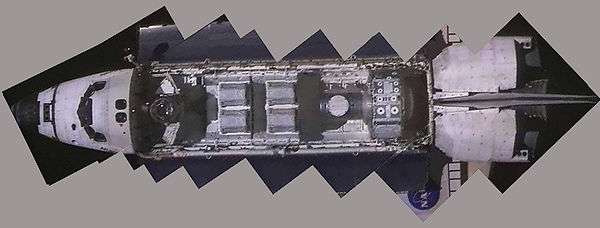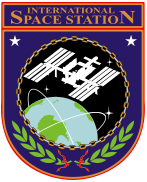STS-104
 Atlantis docked to the Destiny laboratory on the ISS, taken from atop the P6 truss during an EVA | |||||
| Mission type | ISS assembly | ||||
|---|---|---|---|---|---|
| Operator | NASA | ||||
| COSPAR ID | 2001-028A | ||||
| SATCAT № | 26862 | ||||
| Mission duration | 12 days, 18 hours, 36 minutes, 39 seconds | ||||
| Distance travelled | 8,500,000 kilometres (5,300,000 mi) | ||||
| Orbits completed | 200 | ||||
| Spacecraft properties | |||||
| Spacecraft | Space Shuttle Atlantis | ||||
| Launch mass | 117,129 kilograms (258,225 lb) | ||||
| Landing mass | 94,009 kilograms (207,254 lb) | ||||
| Payload mass | 8,241 kilograms (18,168 lb) | ||||
| Crew | |||||
| Crew size | 5 | ||||
| Members |
Steven W. Lindsey Charles O. Hobaugh Michael L. Gernhardt Janet L. Kavandi James F. Reilly | ||||
| EVAs | 3 | ||||
| EVA duration | 16 hours, 30 minutes | ||||
| Start of mission | |||||
| Launch date | 12 July 2001, 09:04 UTC | ||||
| Launch site | Kennedy LC-39B | ||||
| End of mission | |||||
| Landing date | 25 July 2001, 03:38 UTC | ||||
| Landing site | Kennedy SLF Runway 15 | ||||
| Orbital parameters | |||||
| Reference system | Geocentric | ||||
| Regime | Low Earth | ||||
| Perigee | 372 kilometres (231 mi) | ||||
| Apogee | 390 kilometres (240 mi) | ||||
| Inclination | 51.6 degrees | ||||
| Period | 92.2 minutes | ||||
| Docking with ISS | |||||
| Docking port |
PMA-2 (Destiny forward) | ||||
| Docking date | 14 July 2001 03:08 UTC | ||||
| Undocking date | 22 July 2001 04:54 UTC | ||||
| Time docked | 8 days, 1 hour, 46 minutes | ||||
  Left to right: Seated - Charles O. Hobaugh, Steven W. Lindsey; Standing - Michael L. Gernhardt, Janet L. Kavandi, James F. Reilly
| |||||
STS-104 was a Space Shuttle mission to the International Space Station (ISS) flown by Space Shuttle Atlantis. Its primary objectives were to install the Quest Joint Airlock and help perform maintenance on the International Space Station. It was successful and returned to Earth without incident, after a successful docking, equipment installation and three spacewalks.
Crew
| Position | Astronaut | |
|---|---|---|
| Commander | Steven W. Lindsey Third spaceflight | |
| Pilot | Charles O. Hobaugh First spaceflight | |
| Mission Specialist 1 | Michael L. Gernhardt Fourth spaceflight | |
| Mission Specialist 2 | Janet L. Kavandi Third spaceflight | |
| Mission Specialist 3 | James F. Reilly Second spaceflight | |
Mission highlights

The primary purpose of the flight was to deliver and install the Quest airlock. The Joint Airlock is a pressurized flight element consisting of two cylindrical chambers attached end-to-end by a connecting bulkhead and hatch. Once installed and activated, the ISS airlock became the primary path for International Space Station space walk entry and departure for U.S. spacesuits, which are known as Extravehicular Mobility Units, or EMUs. In addition, the Joint Airlock is designed to support the Russian Orlan spacesuit for EVA activity.
The Joint Airlock is 20 ft (6.1 m) long, 13 ft (4.0 m) in diameter and weighs 6.5 short tons (5.9 metric tons). It was built at the Marshall Space Flight Center (MSFC) by the Space Station Prime Contractor Boeing. The ISS-airlock has two main components: a crew airlock and an equipment airlock for storing EVA gear and EVA preflight preps. STS-104 also carries a spacelab pallet with four High Pressure Gas Assembly containers that were attached to the exterior of the airlock.
Mission Specialists Michael Gernhardt and James Reilly conducted three space walks while Space Shuttle Atlantis was docked to the International Space Station. They spent a total of 16 hours and 30 minutes outside. During the first space walk, Gernhardt and Reilly assisted in the installation of the airlock. During the second and third excursions, they focused on the external outfitting of the Quest airlock with four High Pressure Gas Tanks, handrails and other vital equipment. The third spacewalk was conducted from Quest itself.[1]
First flight of Block II SSME
STS-104 was the first shuttle mission to fly with a "Block II" SSME. Post-launch analysis indicated an anomaly occurred when the engine was shut down. The cause was determined and the mitigation approach was demonstrated on the STS-108 flight in November 2001.[2]
Space walks
- Gernhardt and Reilly – EVA 1
- EVA 1 Start: 15 July 2001 – 03:10 UTC
- EVA 1 End: 15 July 2001 – 09:09 UTC
- Duration: 5 hours, 59 minutes
- Gernhardt and Reilly – EVA 2
- EVA 2 Start: 18 July 2001 – 03:04 UTC
- EVA 2 End: 18 July 2001 – 09:33 UTC
- Duration: 6 hours, 29 minutes
- Gernhardt and Reilly – EVA 3
- EVA 3 Start: 21 July 2001 – 04:35 UTC
- EVA 3 End: 21 July 2001 – 08:37 UTC
- Duration: 4 hours, 02 minutes

Wake-up calls
NASA began a tradition of playing music to astronauts during the Gemini program, which was first used to wake up a flight crew during Apollo 15.[3] Each track is specially chosen, often by their families, and usually has a special meaning to an individual member of the crew, or is applicable to their daily activities.[3][4]
| Flight Day | Song | Artist/Composer | Links |
|---|---|---|---|
| Day 2 | "Wallace Courts Murron" | Braveheart Soundtrack | wav mp3 Transcript |
| Day 3 | "God of Wonders" | Caedmons Call | wav mp3 Transcript |
| Day 4 | "Space Cowboy" | 'N Sync | wav mp3 Transcript |
| Day 5 | "No Woman, No Cry" | Bob Marley | wav mp3 Transcript |
| Day 6 | "Nobody Does it Better" | Carly Simon, from the The Spy Who Loved Me soundtrack | wav mp3 Transcript |
| Day 7 | "Happy Birthday, Darling" | Conway Twitty | wav mp3 Transcript |
| Day 8 | "All I Wanna Do" | Sheryl Crow | wav mp3 Transcript |
| Day 9 | "A Time to Dance" | Space Center Intermediate School Symphonic Band | wav mp3 Transcript |
| Day 10 | "I Could Write a Book" | Harry Connick Jr., from the soundtrack to When Harry Met Sally | wav mp3 Transcript |
| Day 11 | "Who Let the Dogs Out?" | The Baha Boys | wav mp3 Transcript |
| Day 12 | "Orinoco Flow" | Enya | wav mp3 Transcript |
| Day 13 | "Honey, I'm Home" | Shania Twain | wav mp3 Transcript |
| Day 14 | "Hold Back the Rain" | Duran Duran | wav mp3 Transcript |
See also
- List of human spaceflights
- List of International Space Station spacewalks
- List of Space Shuttle missions
- List of spacewalks and moonwalks 1965–1999
- Outline of space science
References
![]() This article incorporates public domain material from websites or documents of the National Aeronautics and Space Administration.
This article incorporates public domain material from websites or documents of the National Aeronautics and Space Administration.
- ↑ "Giving the space station a doorway to space". NASA.
- ↑ Greene, William D.; Kynard, Michael H. (2002). "Understanding and Resolution of the Block 2 SSME, STS-104 Engine Shutdown Pressure Surge In-Flight Anomaly". Smithsonian Astrophysical Observatory.
- 1 2 Fries, Colin (25 June 2007). "Chronology of Wakeup Calls" (PDF). NASA. Retrieved 13 August 2007.
- ↑ NASA (11 May 2009). "STS-104 Wakeup Calls". NASA. Retrieved 31 July 2009.
